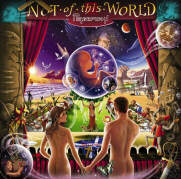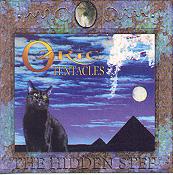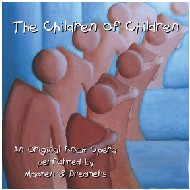
REVIEWS
PENDRAGON - Not Of
This World
(Toff Records, 2001)

After
five years of waiting, the pioneers of English New-Prog are
finally back with their 6th full-length album, still featuring
the same line-up (Nick Barrett: guitars, vocals; Clive Nolan:
keyboards; Peter Gee: bass; Fudge Smith: drums). Anyone who liked
the last three records ("The World", "The Window
Of Life", "The Masquerade Overture") will not be
disappointed with this release: the five long pieces here
featured are filled with the classic Pendragon elements, i.e. a
great display of melody and technique. But don't imagine a carbon
copy of these predecessors, because some hints of change can be
found between the lines: some intimistic section for voice &
piano only bring a new kind of vocal interpretations by Nick,
maybe inspired more than usual by very personal lyrics (dealing
with his divorce and the separation from his son), as well as
some cyclic repetitions of some main themes, every time performed
with a different arrangement.
So if we can't talk of a "concept album", yet the songs
are strictly tied up with related lyrics and recurring melodies,
though this time some of the typical cristalline moments are
lacking, in favour of much more narrative moments; in fact it
seems that the lyrical contents gained more importance now than
in the past, so the overall listening may result a little less
"easy" , but still rewarding.
Anyway, the first 3 minutes of the title track are possibly the
most symphonic piece of music Pendragon ever wrote. My favourite
from the album is the ever-changing opening track, called "If
I Were The Wind", featuring different moods and a shiver-provoking,
almost moving end-section. The song that differs most from what
you can expect from this consolidated band is maybe "A Man
Of Nomadic Traits", with an unusual verse and a strong
instrumental middle-section.
The CD contains two bonus tracks: they are the acoustic versions
of older tracks "Paintbox" and "King Of The Castle",
originally included in the Polish compilation "The History
1984-2000"
OZRIC TENTACLES - The
Hidden Step
(Stretchy, 2000)

This time in full
Egyptian environment, the nearly-annual appointment with the
masters of space rock brings us seven more gems of brilliant
weirdness. For those who are not familiar with this essential
band, maybe it's enough to say that they are responsible for the
revival of psychedelic instrumental music in the 80's/90's.
Mixing rock, eastern folk, reggae-dub, progressive and sometimes
a techno-ambient flavour, their style is now a reference in
itself. Led by guitar wizard Ed Wynne, the current lineup also
includes "Jumping" John Egan on various flutes (he's
also the front man in their live appearances), Seaweed on keys
and knobs, Zia Geelani on bass and Rad on drums/percussion.
The tracks on this album can be divided into guitar-led ones
("Holohedron", "The Hidden Step", "Pixel
Dream"), keyboards-led ones ("Aramanu", "Ashlandi
Bol", "Tight Spin") and the wonderful hypnotic
piece of work that closes the record: "Ta Khut", seven
minutes of magic featuring the Kaval, a Bulgarian flute, some
acoustic guitar arpeggios, an atmospheric synth soundscape and
windchimes.
A little more rock oriented than their previous effort ("Waterfall
Cities"), this is an album that cannot disappoint the
dedicated "Erpmen" (Ozric fans), though the recipe is
basically the same as always, I really don't find any argument to
feel unhappy with the result...another highly recommended record!
IQ - The
Seventh House
(GEP, 2001)

Seventh
studio album for this legend of English new progressive, the
latest one being the high acclaimed masterwork called "Subterranea",
a double concept album that showed a harder and riff-based edge,
beside their traditional melodic and dreamy sound. This time a
more 'simple' collection of songs, in the way we already
appreciated on "Ever", the 1993 album that marked the
return to the fold of singer Peter Nicholls (the lineup is
completed by Martin Orford on keyboards, Mike Holmes on guitars,
John Jowitt on bass and Paul Cook on drums).
The album is opened by a very long track called "The Wrong
Side of Weird", starting with an uptempo section followed by
Nicholls' characteristic vocal lines, an ever changing track,
unusual and unpredictable. "Erosion" is the shortest
track of the album, yet it's one of the best, with fragile vocals
interrupted by heavy riffs and choral keys. The title track is a
sort of mini-suite, starting again with emotional vocals and
acoustic guitar, the middle section is full of instrumental
breaks, for the delight of our ears, then Nicholls goes back to
the inital theme, this time played by the full band for the
symphonic finale. "Zero Hour" is much more simple, with
a nice acoustic/electric guitar solo. "Shooting Angels"
belongs to a simpler side to the typical IQ sound, with a
saxophone adding colour to a nice melody. The record is closed by
"Guiding Light": the piano and vocals start leaves way
to an explosive instrumental break with guitars and keyboards
chasing each other in a nearly prog-metal way (!), until the
singer comes back for the finale, eventually taking the emotional,
subtle, beautiful lines of the start. Great!
All in all, another masterpiece from this band, the formula is
the same as in the last three albums, but why change when the
result is so enjoyable? It's not so easy to find songs well
crafted as these: melody, power and wonderful vocal lines.
Recommended!
MADMEN AND DREAMERS - The
Children Of Children
(MadElf Productions, 2000)

Reviewing
a double concept album is somehow peculiar, indeed. It's because
of the length of the opera and the lyrical contents, often
bearing the same importance of the musical one.
This is the case of Madmen and Dreamers' debut album. This five
piece band from New Jersey (Mark Durstewitz: keyboards and
composition, Mario Renes: bass, Vince Genella: guitars, Bob
Dunleavy: drums, Christine Hull: vocals, with the collaboration
of three more singers) have released an original Rock Opera, as
is stated on the cover, dealing with teenage parenthood, divorce
and the consequent parent/children alienation. The characters in
the storyline are the Mother, the Father, the Son and the
Daughter.
I had a dilemma: a general review or a detailed one? Well, the
former would be a short statement: forget progressive rock
musical and lyrical stereotypes, there are no knights and castles,
only everyday life, and no trace of self-indulgent virtuosism,
only serious musicianship. I know this is not enough, this work
deserves a description in depth, so here we go.
Act One starts with a
symphonic Overture, featuring a Floydian
electric guitar solo, as well as classical guitar and piano, then
we're projected into the title track The Children
Of Children (pt.1), a male/female vocal duet enriched
by a sharp guitar and a dramatic melody. Conception is an instrumental
intermezzo, the piano here echoes "The Great Gig in the Sky"
or "Us And Them", but Floydian influences are only one
side of M&D's sound, and there will be time to discover it. The Big
Belly Blues
is completely different: a bluesy guitar, a jazzy piano, sax and
hyronical lyrics, the guitar sound recalls something from Spock's
Beard, sometimes. Piano and bells for the instrumental Birth, featuring some creative
drum fills as well. After the reprise of the title track, and a
husband/wife/children 'discussion' (What About
Me?),
it's the time for Love at a Distance, the female vocals are very
emotional here, the piano/bass/cello complete the moody
atmosphere. Madmen and Dreamers starts like another slow-tempo
song, though some heavy guitar chords and drums add energy to
this ballad; in the mid section tempo increases, then the singer
resumes the vocal theme, sounding a bit like some tracks from
Pallas' "The Sentinel", but less bombastic; one of the
highlights. Another Joyful Day is a jingling funny little
tune. I Will Not Fight features some soprano
female vocals from Christine, contrasting with a rocky electric
guitar, but we begin to guess this is the strength of the formula;
a strong rhythm section is the icing on the cake. A bass line à-la
"Careful With That Axe Eugene" introduces Retreat, the guitar solo here is
quite Gilmouresque ("Division Bell" period), this long
(11 min) multiform song turns into an acoustic ballad and then
again into something else, with a mysterious melody, only to end
wih a vocal duet. The arrangement here is of a top-class group;
one of my favourites. Running Wild is splitted into four
sections, starting with a musical box tune and a Gentle Giant-like
multivocal lullaby; next section is straightforward rock with
Hammond, though the singer (Dennis) is not so appropriated for
this style, he shows a good vocal range. After a vocal duet, the
lullaby comes back. Listen to Me is a mid-tempo piano led
song, The Shell echoes the same melody.
High pitched female vocals give character to Your Fault, Christine here recalls
Sandrose's vocalist or even a sort of female Peter Hammill (!),
the feeling is enhanced by the melanchonic melody. I Don't Know
You Anymore
is a rather anonymous uptempo song, while Why Did You
Stay
is a vocal/piano/orchestral reflective piece, with a pleasant 'musical
theater' flavour; All I Need is Life closes Act One in a rather
narrative way, but with a rock arrangement this time, featuring a
nice distorted guitar solo.
Act Two starts with a
reprise of some themes (namely Listen To Me, The Shell, Your
Fault), then a short piano/synth atmospheric piece (One Moment
Please)
leads us into another piano driven song, Such as it
is, with bass in good evidence (the
sound of the piano is the 'trait d'union' in the whole opera). An Eagle and
a Dove
features very poetical lyrics, giving a sense of serenity; the
romantic feeling is enhanced by a classical guitar solo à-la
Steve Howe, while the electric guitar solo at the end makes you
willing for more. Tell Me is plain rock-blues with a sax, even
the vocals are in perfect style, though a bit monochord, while The Life You've
Given Me
is another typical mid-tempo piano-driven moment. And As For
Me is
an intimistic vocal/keys tune, much more original is Where Are
You Now,
a Peter Hammill-like vocal/piano melody with a moody feel to it,
preparing the listener for the "grand" finale (and the
happy ending) Daddy Can We Talk?: sung by Erika (the
daughter), the vocals and piano bring a strong Renaissance (the
band!) feeling, although at this point we can recognize Mark's
original piano lines; this is one of the most "classic prog"
songs of the album, with a Brian May-ish electric guitar adding a
Queen touch to it. The fast solo is perhaps more in the vein of
Dream Theater's John Petrucci. The end section, with the return
of Dennis' vocals is highly emotional, a worth conclusion of this
musical journey.
The only thing I need to add is that all the resemblances I
noticed are merely a way to make description easier, the
originality of this work is the same, for example, of Coda's
"What a Symphony", that is a way to be progressive
without necessarily recurring to 70's patterns or clichés. The
length of the opera means that a higher level of attention is
required to fully appreciate it, and a certain number of
listenings are needed not to lose themselves in these 2 hours and
more of music, although the several theme reprises help in this
sense.
I recommend this album not only to prog-freaks, it can surely be
appreciated by all clever-rock listeners!